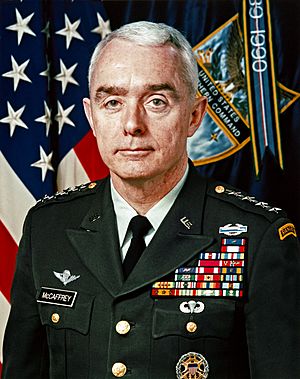Barry McCaffrey facts for kids
Quick facts for kids
Barry McCaffrey
|
|
|---|---|

Official portrait, 1994
|
|
| Director of the Office of National Drug Control Policy | |
| In office 29 February 1996 – 20 January 2001 |
|
| President | Bill Clinton |
| Preceded by | Lee Brown |
| Succeeded by | Ed Jurith (acting) |
| Personal details | |
| Born |
Barry Richard McCaffrey
17 November 1942 Taunton, Massachusetts, United States |
| Spouse | Jill Ann Faulkner |
| Relatives | William J. McCaffrey (father) |
| Education | United States Military Academy (BS) American University (MA) |
| Military service | |
| Allegiance | United States |
| Branch/service | United States Army |
| Years of service | 1964–1996 |
| Rank | General |
| Commands | United States Southern Command 24th Infantry Division |
| Battles/wars | Vietnam War Gulf War |
| Awards | Distinguished Service Cross (2) Defense Distinguished Service Medal (2) Army Distinguished Service Medal (2) Silver Star (2) Defense Superior Service Medal Legion of Merit Bronze Star Medal (4) Purple Heart (3) |
Barry Richard McCaffrey (born November 17, 1942) is a retired United States Army general. He served in President Bill Clinton's Cabinet and later became a news commentator and professor.
During his long military career, he was known for his bravery. He received three Purple Heart medals for injuries during the Vietnam War. He also earned two Silver Stars and two Distinguished Service Crosses. This is the second-highest award for courage in the U.S. Army. In 2007, he was added to the U.S. Army Ranger Hall of Fame.
After retiring from the army, McCaffrey became a professor at the United States Military Academy. He is also a military analyst for NBC and MSNBC news. He runs his own consulting company and serves on the boards of several large corporations.
Contents
Early Life and Schooling
Barry McCaffrey was born in Taunton, Massachusetts. He went to Phillips Academy, a well-known prep school, and graduated in 1960. After that, he attended the United States Military Academy at West Point, finishing in 1964.
He continued his education while in the military. He earned a Master of Arts degree from American University. He also studied at Harvard University. McCaffrey learned to speak Vietnamese at the Defense Language Institute. This helped him during his service in the Vietnam War.
Military Career
After graduating from West Point, McCaffrey became an infantry officer. He served in combat several times. He was in the Dominican Republic in 1965 and served two tours in the Vietnam War.
His non-combat jobs were also important. He taught at West Point from 1972 to 1975. He also worked with NATO and served as an assistant to the Chairman of the Joint Chiefs of Staff.
The "Left Hook" Attack in the Gulf War
During Operation Desert Storm in 1991, McCaffrey commanded the 24th Infantry Division. He led a famous and successful surprise attack known as the "left hook." His division traveled over 230 miles through the Iraqi desert.
This bold move outsmarted the enemy forces. It helped cut off their escape route from Kuwait. The "left hook" was a key part of the plan that led to a quick victory for the allied forces in the Gulf War. It was one of the largest and fastest-moving attacks of its kind in military history.
Disagreements About a Gulf War Battle
After the war, there was some debate about a battle that happened after a ceasefire was announced. Some reports claimed that troops under McCaffrey's command used too much force against retreating Iraqi soldiers.
Journalist Seymour Hersh wrote an article in 2000 that raised questions about the event. McCaffrey stated that his soldiers were fired upon first and had to defend themselves. An official U.S. Army investigation looked into the matter. The investigation cleared General McCaffrey of any wrongdoing.
Final Military Role
McCaffrey's last job in the army was as commander of the United States Southern Command (SOUTHCOM) from 1994 to 1996. This command is in charge of U.S. military activities in Central and South America.
While at SOUTHCOM, he helped with humanitarian efforts for thousands of Cuban refugees in Panama. He also created the first Human Rights Council for a U.S. Military Joint Command. He believed that respecting human rights made security forces more effective. When he retired in 1996, he was the youngest four-star general in the army.
Work in the U.S. Government
In 1996, President Bill Clinton appointed McCaffrey as the Director of the Office of National Drug Control Policy (ONDCP). The U.S. Senate approved his appointment without a single vote against him. As director, he was a member of President Clinton's Cabinet.
In this role, he created the country's first long-term National Drug Control Strategy. This 10-year plan aimed to reduce the harm caused by illegal substances through education and prevention. His office also worked with television networks to include anti-drug messages in popular TV shows. This was part of a national media campaign to educate young people.
Life After Government Service
After leaving his government post in 2001, McCaffrey continued to share his knowledge. He became a military analyst for NBC and MSNBC, where he comments on military and security issues. He also started his own consulting firm, BR McCaffrey Associates.
He serves on the boards of several companies and organizations. These include the Atlantic Council and DynCorp International. He is also involved with groups that support veterans and military families. McCaffrey often speaks at conferences about public health policy and special courts for veterans.
Personal Life
McCaffrey is married to Jill Ann Faulkner. They have three children, named Sean, Tara, and Amy. Their son, Sean, also had a career in the army, serving three combat tours before retiring as a colonel.
Images for kids
 | Misty Copeland |
 | Raven Wilkinson |
 | Debra Austin |
 | Aesha Ash |


